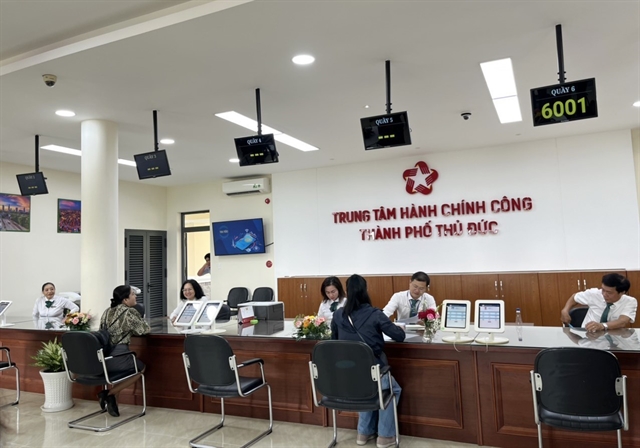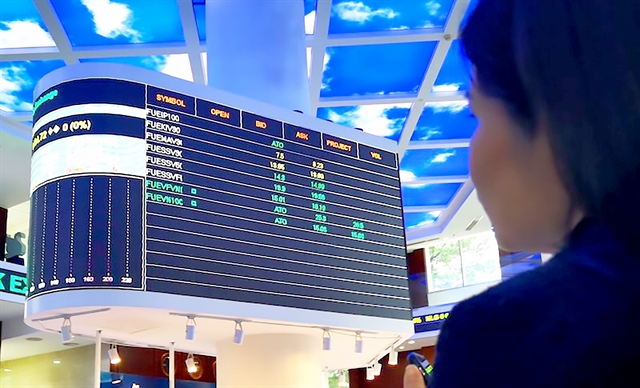 Economy
Economy

Digital transformation will help raise investor awareness, consolidate confidence, develop fund investment products and services towards customers’ demands and improve fund's operation efficiency.

|
| An investor watch the market at HCM City Stock Exchange. The State Securities Commission would make the effort to upgrade the market by 2025, attract foreign capital into the stock market to develop the economy which would also promote the development of the fund industry. — VNA/VNS Photo |
HÀ NỘI — Accelerating digital transformation is critical for the fund industry to tap the market potential and expand operations in Việt Nam, experts said.
Dương Văn Thanh, general director of Việt Nam Security Depository and Clearing Corporation (VDSC), said that the fund industry was gradually improving after a turbulent 2022 and is expected to develop in the coming years.
As of November, many recorded higher business growth than the market average, such as VinaCapital – VESAP, SISCA, VCBF-MGF, DCDS, DCBC reporting growth of more than 30 per cent. The number of funds also saw increases, especially open funds.
He cited statistics that VDSC was currently providing transfer agency services for 53 open funds, 12 funds higher than the end of 2022, including 25 stock investment funds, 23 bond investment and 5 balanced funds. Besides, VDSC provides services for 13 exchange-traded funds (ETFs) and 3 closed-end funds.
“VDSC expects that the fund industry will not only increase in quantity but also in quality in the coming time. Products related to the fund industry would be more abundant to bring greater efficiency to investors,” Thanh said.
Regarding the voluntary supplementary pension fund, VDSC provides personal retirement account management services for 8 funds of 4 fund management companies. The total number of individual retirement accounts increased sharply from 1,699 at the end of 2022 to 21,971 by the end of October 2023.
VDSC would expand services for voluntary supplementary pension funds in 2024, forecasting a significant increase in the number of accounts in this segment.
Giang Trung Kiên, deputy director of MBCapital, said that the fund industry was having a great opportunity to develop, given the sharp increases in the number of individual investors participating in the stock market in recent years, the rising proportion of demand deposit or current account savings account (CASA) and record-low short-term deposit interest rates, which made financial products such as Money Market Fund more attractive for idle cash flow.
Trương Diệu Linh from Vietcombank said that the fund industry would need to diversify investment products, besides traditional stock investment funds, towards others such as real estate investment funds, pension funds, technology funds, venture capital funds, green bond funds, and ESG funds.
Besides, it was necessary to enhance communications to increase awareness of the public and investors about the operation of the fund industry and the investment in fund certificates.
She also urged the State Securities Commission, the State Bank of Việt Nam (SBV), and VDSC to increase the management and supervision of the market to prevent violations.
In addition, fund management companies should strengthen the application of technology in the management of operation to improve efficiency and reduce risks, she said.
Going digital
According to Phí Tuấn Thành, director general of Techcom Capital, the total asset value managed by fund investment companies in Việt Nam was estimated at US$23.25 billion, or 2.44 per cent of GDP, still lower than some other countries in ASEAN such as Thailand and Malaysia with rates of around 30 per cent.
Only around 1 per cent of stock investors had fund certificate accounts, with just 1 per cent of their net asset value invested in funds.
One of the reasons was that investors’ awareness and understanding of investing through funds remained limited. Investment products and services of funds were not yet developed or suitable for investors, especially through digital channels, he pointed out.
“The application of new technologies is necessary for the fund industry to fully exploit the largely untapped potential,” Thành said, stressing that digital transformation was an inevitable trend. “Digital transformation will help raise investor awareness, consolidate confidence, develop fund investment products and services towards customers’ demands and improve fund's operation efficiency.”
The focus should be on improving the business environment to create a favourable legal framework for the application of digital technologies in the fund management industry, Thành said, urging fund management companies to build human resources to implement technology solutions.
Đoàn Duy, in charge of digital transformation business at Dragon Capital, said that customers of fund management companies tended to be younger, more diverse, and more active in researching and comparing products online and wanted everything to be done online, such as online KYC and online order placement.
“Technology has changed perspectives. Digital transformation is the direction for the fund industry,” Duy said.
Stressing the large potential for the development of the fund industry, Lương Hải Sinh, Deputy Chairman of the State Security Commission, cited statistics that the total net asset value of stock investment funds accounted for just a modest proportion in GDP, with 250,000 investors or 0.24 per cent of the country’s population, lower than Thailand and Malaysia.
Sinh urged funds to speed up the application of digital technologies in operation and business, adding that the State Securities Commission would focus on four pillars to promote the development of the securities market and fund industry.
The first pillar was to develop quality products in the stock market and improve market structure with a full range of financial investment products.
The second was to build a transparent public trading market towards sustainable development.
The third pillar was to develop intermediary organisations and securities trading organisations to be professional and effective following international practices. The final pillar was to diversify investors, with a focus on developing professional stock investors.
Specially, the State Securities Commission would make an effort to upgrade the market, and attract foreign capital into the stock market to develop the economy, which would also promote the development of the fund industry. — VNS




